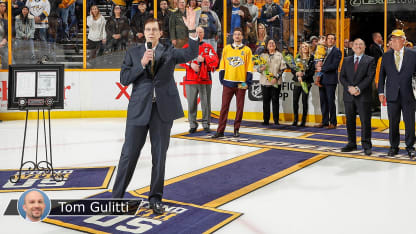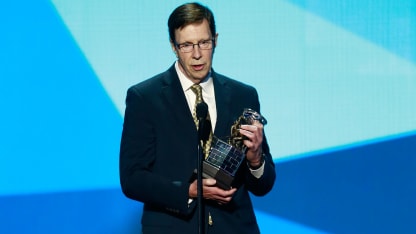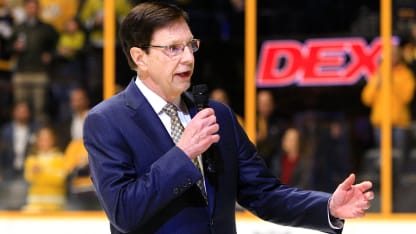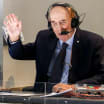Poile inspired by father on way to U.S. Hockey Hall of Fame
Learned from his NHL success to set League wins record for GM with Capitals, Predators

© Getty Images
His father, Bud, a 1990 inductee into the Hockey Hall of Fame as a Builder, was the first GM of the expansion Philadelphia Flyers in 1967 and the expansion Vancouver Canucks in 1970.
So it seemed natural for Poile to join the expansion Atlanta Flames as an administrative assistant under GM Cliff Fletcher in 1972, shortly after he graduated from Northeastern University. That led to him being named the Flames assistant GM five years later, general manager of the Washington Capitals in 1982, and the first GM of the expansion Nashville Predators in 1997, more than a year before their first game.
"What my dad did and what I've done are very similar," Poile said. "I think in a lot of ways I've taken almost the same path. … The Poiles seem to be planners and builders."
For his success in planning and building over 47 years in the NHL, including the past 36 as a general manager, and with USA Hockey, Poile will be inducted into the United States Hockey Hall of Fame in Nashville on Dec. 12 along with retired NHL referee Paul Stewart, legendary college coach Red Berenson, three-time U.S. Olympian Natalie Darwitz and former NHL player Hago Harrington.
Poile, 68, is the NHL's all-time leader in wins by a general manager with 1,352 after passing Glen Sather (1,319 wins) last season and the only GM in League history to spend at least 1,000 games with two franchises. He is 758-586-148 and 60 ties with Nashville since it entered the NHL in 1998 and was 594-454 with 132 ties in 15 seasons with Washington.
He won the NHL General Manager of the Year Award in 2017 and has been a four-time finalist for the honor since its inception in 2010, the most of any GM.
"First of all, he's tops in integrity," said Capitals president Dick Patrick, who hired Poile in Washington. "He's really honest and straightforward. He's very, very responsible. He does everything he has to do that has to be done. He treats people the right way. Sometimes he has to do things like fire coaches. Things like that are never easy, but I think he's always approached the hard things in the correct manner and he was just really diligent and hard working."

© Getty Images
Poile, who was born in Toronto and played three seasons at Northeastern, received the Lester Patrick Award for outstanding service to hockey in the United States in 2001. He first became involved with USA Hockey as GM for the 1998 IIHF World Championship in Switzerland.
He served on the U.S. Men's National Team Advisory Group since it formed in 2007, was associate GM for the United States when it won the silver medal at the 2010 Vancouver Olympics and general manager for the U.S. when it finished fourth at the 2014 Sochi Olympics.
"I am extremely proud of the way USA Hockey has grown in leaps and bounds the last 20-25 years, where at tournament levels, whether it be world juniors or world championships or the Olympics, the United Sates, respectfully, was not competing as a top country," Poile said. "Today, I think when we enter any tournament our expectations are basically to win. And there have been so many players that are coming from new and different regions throughout the United States.
"In the old days, it used to be the three Ms - Michigan, Minnesota and Massachusetts. Now, we've got Auston Matthews from Arizona, Seth Jones from Texas, players from California on a regular basis, from Florida and hopefully one day we'll have a player born in Tennessee. I think that's going to happen someday, too."
If it does, Poile deserves some credit for that. He helped grow the Nashville hockey market from scratch.
"We had to build one fan at a time, so we were doing things different," said New York Islanders coach Barry Trotz, who coached the Predators their first 15 seasons. "How we did our game presentations were way different. How we went about our approach to teaching and selling hockey in a non-traditional market was way different. We did things the Nashville way and I learned so much about the game, the people, setting up, and it was all due to David's ability to allow to you have a say, and communicate."
Devils assistant GM Tom Fitzgerald, who was the Predators' captain their first four seasons after also playing for the expansion Florida Panthers for five years, remembers how meticulous Poile was. He also saw how Poile was willing to be patient to make sure the Predators were built to be competitive for the long haul.
"The biggest takeaway I have from watching David and being in management now and playing on two expansion teams was slow and steady wins the race," Fitzgerald said. "His patience, his knowledge of his team -- his management team, his coaching team, the players, the staff -- he really knows how to manage people. He put together a great staff there right from the start, but he wanted to make sure everybody was on the same page, and that was slow and steady."
Poile took a different initial approach with the Capitals, a 1974 expansion team that hadn't qualified for the Stanley Cup Playoffs or finished with a winning record in any of its eight seasons before he was hired on Aug. 30, 1982. He was 32 and the NHL's youngest GM at the time, but that didn't stop him from jumping directly into the deep end.
In a franchise-changing trade completed 10 days after Poile took the job, the Capitals acquired defensemen Rod Langway and Brian Engblom, and forwards Doug Jarvis and Craig Laughlin, from the Montreal Canadiens for defenseman Rick Green and forward Ryan Walter.
"I went to the Board of Governors meeting in Toronto because nobody was going from the Capitals," Poile said. "Nobody was going to it and, I said, 'Well, that's very important. That's a power position.' I walked into the room at age 32 scared to death and I sat down next to [Canadiens GM] Irving Grundman. And that's what happened."

© Getty Images
Walter was Washington's captain and happened to be then-owner Abe Pollin's favorite player, but Poile felt he needed to do something drastic. Before he was hired, there was talk of the team leaving Washington.
"Maybe it was to David's advantage that being brand new he didn't have a personal connection to those guys," Patrick said. "But he's had a history since then of making big trades. He's got that down. … Rod Langway was just the right guy at the right time to come in and be the leader and energize the fanbase."
The Capitals went 39-25 with 16 ties that year to begin a run of 14 consecutive seasons in the playoffs.
Langway, a 2002 inductee into the Hockey Hall of Fame, was a big part of that. He won the Norris Trophy in 1982-83 and 1983-84 and played in the NHL All-Star Game five times in his 11 seasons with the Capitals.
But Craig Laughlin said it was also about the culture Poile helped create that stood out in Washington.
"David Poile would talk to you. He was very personable," said Laughlin, a longtime analyst for Capitals telecasts on NBC Sports Washington. "He was honest, but he was loyal. He was always loyal. He always talked to you. He wasn't a GM who would just walk by you, even if you were playing lousy. A lot of GMs would just kind of turn away (thinking), 'I might be dealing him or whatever. I don't want to talk to him today.'
"That was never David and to me that was the reason that we had success. It was those dynamics that made the team."
The one thing missing for Poile is a Stanley Cup championship. He came close in 2017 when the Predators lost to the Pittsburgh Penguins in the Stanley Cup Final. Nashville was a Cup favorite last season after winning the Presidents' Trophy but was eliminated by the Winnipeg Jets in the Western Conference Second Round.
With his 69th birthday approaching on Feb. 14, Poile does not know how many more shots he'll get at winning that elusive championship. He said he's been working on a year-to-year basis for the past eight seasons, but isn't planning on giving up his Cup dream.
"I've been chasing that for a long, long time," he said. "Obviously, it's very difficult to do and I've think we've had lots of good clubs along the way, whether it was here or in Washington, and haven't gotten it done. So, would I like to get that on my resume? Absolutely."

















